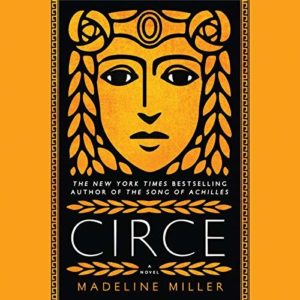Narrated by Perdita Weeks
I hope many of you have heard of Madeline Miller. She’s the enormously talented author who’s taken vaguely familiar mythological stories (Circe and The Song of Achilles), and re-imagined them for a 21st century audience. Even if you have very little familiarity with Greek mythology (me), her slightly contemporary twists on these stories is enlightening and wonderful. The pacing, the writing, the characterizations, the settings… it all feels effortless, and I can’t recommend this book highly enough. Based on the strong connection I had with Circe (and The Song of Achilles), I decided to listen to them, too. Friends, narrator Perdita Weeks absolutely brings Circe to life, and her interpretation of this complicated woman is a revelation. I enjoyed the written novel; I loved the audio version. (PS: Stay tuned for a review of The Song of Achilles. I’m listening to it now.)
Circe, daughter of Helios, Greek god of the sun, and the ocean nymph Perse, was something of a black sheep in her family. Alternately ignored, belittled or bullied by her parents and siblings (Pasiphaë, Perses, and Aeëtes) for her lack of power or cunning, Circe grew up at a distance from the rest of her family, an afterthought to their intrigues. Left to her own devices, she develops a fascination with mortals after a brief – albeit intense and unforgettable – encounter with a bound and chained Prometheus. Later, when a fisherman sails into the secluded cove where she spends her afternoons, her curiosity compels her to speak to him. Circe and Glaucus form a friendship of sorts, until one day Circe – who believes herself in love with the poor, often angry fisherman – drips the syrup of a local herb into the mouth of a sleeping Glaucus. When he awakens no longer a man, but a god, Circe is shocked but thrilled with the result. She keeps her suspicions about her powers a secret, spending her days hoping for Glaucus’s attention.
Unfortunately, to no one’s surprise, once Glaucus becomes immortal, he loses interest in Circe. He falls in love instead with another beautiful sea nymph, Scylla. Scylla enjoys teasing Circe with her conquest of Glaucus, and a jealous Circe tries and fails to ignore her. One day, after failing to control her anger at Scylla, Circe pours a home-brewed concoction created from her beloved plants and herbs into Scylla’s bathing water. Scylla is at once transformed into a hungry monster. As rumors of her beastly appearance and appetite spread, a guilty Circe confesses what she’s done to her father. Helios, once he realizes Circe is a witch, banishes her to the deserted island of Aiaia to live out the rest of her life in exile.
Circe begins as a series of vignettes illustrating a naive and lonely life, but on Aiaia, Circe finds herself and her power. Truly, when I started reading/listening to this novel, I couldn’t believe I would find a common bond with a sea nymph turned powerful witch, but in Ms. Miller’s capable hands, Circe feels both relatable and familiar. I found much to love and admire in her perfections and imperfections. She longs for love and acceptance, for friendship and companionship, and struggles with self-doubt and insecurities. She learns what it truly means to be lonely, and to embrace the life she’s forced to live. Compassionate and kind, loyal and passionate, curious and strange, over time, Circe learns her strengths and ruthlessly purges her weaknesses. It’s a brilliant and seamless merging of her identity as a mythological figure with that of an indomitable and fierce woman.
But what elevates Circe – and kept this listener enthralled and engrossed chapter after chapter – is how effortlessly Miller integrates Circe’s life into those of the most powerful mythological figures of her time. Olympians, heroes of ancient Greece, strangers and friends – all play pivotal roles in her story – and their petty squabbles, rivalries, passions, jealousies and intrigues wreak havoc on Circe’s otherwise peaceful existence. Many readers are familiar with The Odyssey, and Odysseus’s ten-year journey home to his kingdom in Ithaca after the Trojan War, but Circe subtly shifts the perspective – presenting his sojourn in Aiaia through Circe’s eyes, and the PoV change is fascinating. Shaped by her own, sometimes violent, experiences with strange sailors arriving on her doorstep, her actions – she initially changes Odysseus’s sailors into pigs – makes perfect, frightening sense. Hermes initially comes across as a trusted friend and lover, until he reveals himself as a smug, and often hurtful, almost Machiavellian figure with no true loyalty to Circes. And Athena… well, I’ll leave her story for you to discover on your own.
I loved Circe in ebook form, but the audio is a revelation. I didn’t have a voice in mind reading the novel, but now that I’ve listened to Perdita Weeks tell this story, I can’t imagine anyone else doing it justice. She is Circe. Weeks captures every nuance of this character from her happiest moments, to her lowest lows, and everything in between, and her performance is as close to perfection as possible. She lulls you into the slow, thoughtful cadence of Circe’s spoken words, only alternating her pitch when Circe is agitated (confessing to her father), or slower – like when she’s stealthily trapping a predatory male, or desperate – a mother trying to convince her son not to leave. Her pacing and tone marvelously match the material, and capture Circe in all manner of emotion. Ms. Weeks does an equally excellent job voicing secondary characters in this story; whether she’s pitching her tone low to hit the deeper, male voices, or mimicking her darling niece Ariadne, or capturing the studied insouciance and gleeful viciousness of her sister Pasiphaë (mother to the minotaur), her narration is strong throughout. The characterization of Odysseus’s son Telegonus, late in the story, is particularly compelling. She perfectly channels his anger and frustration, and sadness and exhaustion arriving in Aiaia, and then seamlessly segues his narration into the thoughtful, gentle, man who slowly penetrates and softens Circe’s hardened heart. It’s a lovely interpretation of this character. Really, Weeks’ performance throughout is intimate and engaging, and I couldn’t wait for moments in my day when I could get away and listen to her magical voice bring Circe to life.
There are so many different kinds of listeners that Circe can and should appeal to. I can’t recommend it highly enough, and I hope many more listeners discover this marvelous story.
Em
Buy Circe by Madeline Miller on Amazon





I listened to this a while ago and loved it! Fantastic review.